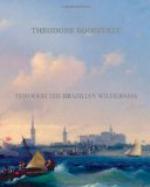As soon as we saw the giant tamandua we pushed off in a rowboat, and landed only a couple of hundred yards distant from our clumsy quarry. The tamandua throughout most of its habitat rarely leaves the forest, and it is a helpless animal in the open plain. The two dogs ran ahead, followed by Colonel Rondon and Kermit, with me behind carrying the rifle. In a minute or two the hounds overtook the cantering, shuffling creature, and promptly began a fight with it; the combatants were so mixed up that I had to wait another minute or so before I could fire without risk of hitting a dog. We carried our prize back to the bank and hoisted it aboard the steamer. The sun was just about to set, behind dim mountains, many miles distant across the marsh.
Soon afterward we reached one of the outstations of the huge ranch we were about to visit, and hauled up alongside the bank for the night. There was a landing-place, and sheds and corrals. Several of the peons or gauchos had come to meet us. After dark they kindled fires, and sat beside them singing songs in a strange minor key and strumming guitars. The red firelight flickered over their wild figures as they squatted away from the blaze, where the light and the shadow met. It was still and hot. There were mosquitoes, of course, and other insects of all kinds swarmed round every light; but the steamboat was comfortable, and we passed a pleasant night.
At sunrise we were off for the “fazenda,” the ranch of M. de Barros. The baggage went in an ox-cart—which had to make two trips, so that all of my belongings reached the ranch a day later than I did. We rode small, tough ranch horses. The distance was some twenty miles. The whole country was marsh, varied by stretches of higher ground; and, although these stretches rose only three or four feet above the marsh, they were covered with thick jungle, largely palmetto scrub, or else with open palm forest. For three or four miles we splashed through the marsh, now and then crossing boggy pools where the little horses labored hard not to mire down. Our dusky guide was clad in a shirt, trousers, and fringed leather apron, and wore spurs on his bare feet; he had a rope for a bridle, and two or three toes of each foot were thrust into little iron stirrups.
The pools in the marsh were drying. They were filled with fish, most of them dead or dying; and the birds had gathered to the banquet. The most notable dinner guests were the great jabiru storks; the stately creatures dotted the marsh. But ibis and herons abounded; the former uttered queer, querulous cries when they discovered our presence. The spurred lapwings were as noisy as they always are. The ibis and plover did not pay any heed to the fish; but the black carrion vultures feasted on them in the mud; and in the pools that were not dry small alligators, the jacare-tinga, were feasting also. In many places the stench from the dead fish was unpleasant.




